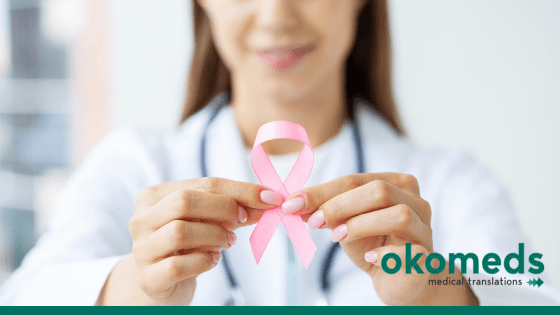
19 Oct Translating women’s health on World Breast Cancer Day
World Breast Cancer Day is an important day. It is an opportunity not only to raise awareness about this disease which affects millions of women around the world, but also to highlight the crucial role that professional medical translation plays in women’s health. In an increasingly globalised world, accurate and professional translation is essential to ensure that women of all cultures and languages have access to the medical information they need to prevent and/or diagnose the disease. This is where translating women’s health comes into play.
Why is specialisation in women’s health important?
Specialisation is very important for a translator’s career and there is an endless list of niches, such as legal translation, marketing, literature, subtitling, editing, voice-over, and medical translation. Other translators choose to specialise in so-called “micro-niches”. That is, a sub-section of a larger, more general category. In the case of medicine, a micro-niche would be women’s health, which is what we are going to deal with in this post.
Translating women’s health
In recent years, women’s issues have been gaining more interest and women’s health is no exception. A growing amount of information is becoming available. In addition to medical and informative texts, there are interesting books, blogs, and podcasts that share tons of information and answer questions about women’s health, from the most frequent questions to those that are much less known.
At the same time, a specialised translation niche is being created in the field and has become an indispensable ally in helping the sector grow and break social taboos around the female body. They all deserve to be translated into lots of languages as more people need to have access to this vital information.
That is why translators with specific knowledge and terminology about women’s health are needed. The knowledge is very varied since the work can relate to diseases affecting the menstrual cycle, women’s mental health, reproductive health, menopause-related problems, hormonal imbalances and chronic diseases such as heart disease or cancer.
Breaking taboos
It is also necessary to reflect on the taboos that still surround menstruation. A few years ago, people were not talking as openly about women’s menstrual cycles as they do now.
With this in mind, a wonderful concept called “body literacy” has emerged, which means becoming aware of what is happening in your body and understanding why it is happening. It is no surprise that translation also helps this “body literacy” to reach more women.
The role of translation in breast cancer
Women’s health is a sensitive issue that requires careful and professional translation. Breast cancer, for example, is one of the most prevalent diseases affecting women worldwide, and its prevention and treatment depend to a large extent on good communication between doctors and patients.
This is where medical translation services come in. Translating essential documents, such as prevention brochures, test results, informed consents and treatment protocols, allows women to fully understand their medical situation and the options available to them, whatever language they speak.
Empowering women through information
There are many places in the world where women do not have the access to information that they should. Translation is crucial to help and support women and their empowerment around health issues and to improve equality, health and quality of life for all women.
One of the keys to improving women’s health outcomes is therefore to provide access to accurate information in the language of each patient. Translation not only breaks down language barriers, but also allows women to empower themselves through knowledge.
Medical translators play a key role in this process, through understanding medical terminology, conveying the message clearly and empathetically and respecting the cultural context of each patient.







No Comments